A Brief Herstory of Cauldron & Labrys
2024: The Secret Lives and Intimate Writings of Sarah Orne Jewett, Edna St. Vincent Millay, Rachel Carson, and May Sarton

A series of four staged readings with post-show conversations presented at the Bar Harbor Historical Society.
This project is comprised of four half-hour segments, performed by a cast of four actors, each segment each
featuring the lesbian lives and work of a prominent writers who lived and worked in Maine. (These
segments could also be presented on separate days.) The four writers are Sarah Orne Jewett, Edna St.
Vincent Millay, Rachel Carson, and May Sarton. Each presentation is composed of minimal narration,
accompanied by readings from these women’s writings, private correspondence, and diaries. In the interest
of historical accuracy, the readings are strictly limited to the words written or spoken by these writers
themselves, or words written or spoken by their contemporaries to or about them. The focus of the segments
is specifically on the writers’ time in Maine and on the aspects of their work that reflect their orientation as
lesbians. (For example, the Sarton segment begins with her move to the state of Maine when she was sixtythree,
and the Millay segment ends when Millay is in her early twenties and moves from Camden to New
York.)
Featuring Tammy Richards, Dezirae Zaman, Katie Migdal, and Cherie Magnello.
This project is comprised of four half-hour segments, performed by a cast of four actors, each segment each
featuring the lesbian lives and work of a prominent writers who lived and worked in Maine. (These
segments could also be presented on separate days.) The four writers are Sarah Orne Jewett, Edna St.
Vincent Millay, Rachel Carson, and May Sarton. Each presentation is composed of minimal narration,
accompanied by readings from these women’s writings, private correspondence, and diaries. In the interest
of historical accuracy, the readings are strictly limited to the words written or spoken by these writers
themselves, or words written or spoken by their contemporaries to or about them. The focus of the segments
is specifically on the writers’ time in Maine and on the aspects of their work that reflect their orientation as
lesbians. (For example, the Sarton segment begins with her move to the state of Maine when she was sixtythree,
and the Millay segment ends when Millay is in her early twenties and moves from Camden to New
York.)
Featuring Tammy Richards, Dezirae Zaman, Katie Migdal, and Cherie Magnello.
2023: A reading of St. Frances and the Fallen Angels
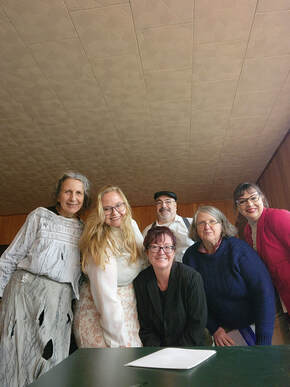
A reading of St. Frances and the Fallen Angels, sponsored by the Southwest Harbor Public Library. The reading was preceded by a mini-concert of 1930's labor union songs by Weslea Sidon, accompanied by Phil Kell.
This is a play about Frances Perkins, the Secretary of Labor under FDR, and her superhuman achievement of the Social Security Act of 1935. It is a story about two women in love, about the ghosts of the Triangle Shirtwaist Fire, and a true Christmas miracle. This is a play about social justice work: the price and the promise.
The actors included Sarah Johnson, Cindy Robbins, Erik Hyatt, Violet Davis Hyatt, and Katie Migdal.
2023: An online reading of Georgia and the Butch: A reading of the letters between Georgia O'Keeffe and Maria Chabot, 1941-1949
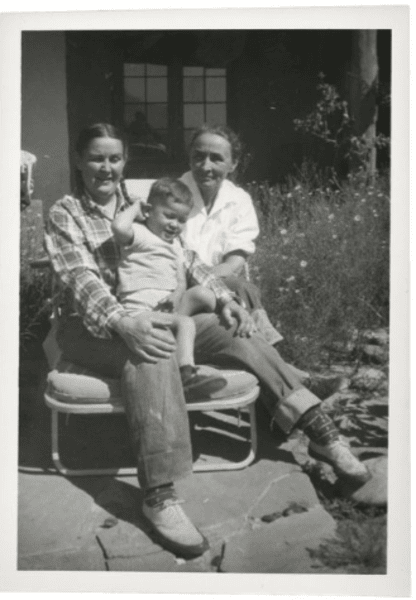
Who was the butch who took Georgia O’Keeffe camping in the mountains of New Mexico, who was her “handyman” (her words), who was her intimate friend for nine years, and who was designer/general contractor/builder for her internationally renowned house in Abiquiu—and who did it all for love?
And why has she been erased from the historical record?
Read by Ria T DiLullo and Gael Schaefer, narration by Carolyn Gage. Special guest: Zibby Wilder, great-great niece of and world authority on Maria Chabot. Zibby will join us for the talkback.
And why has she been erased from the historical record?
Read by Ria T DiLullo and Gael Schaefer, narration by Carolyn Gage. Special guest: Zibby Wilder, great-great niece of and world authority on Maria Chabot. Zibby will join us for the talkback.
2022: An online reading of Starpattern
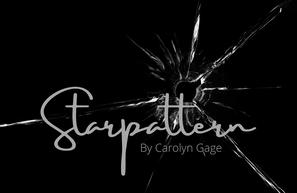
Starpattern is based on a true event that occurred during the mass shooting at the University of Texas at Austin in 1966. The first victim, Claire Wilson, a young student who was eight months pregnant, lay wounded on the blazing mall under the sniper's Tower and still in his line of fire. People were too afraid to rescue her. Suddenly, a young lesbian Rita Starpattern, at tremendous risk, ran out and lay down next to Claire. She stayed with Claire, keeping her conscious until she was rescued.
I wrote the play as a tribute to both women, but also to offer up a blueprint for shifting the paradigm of patriarchal violence. These women, under the most hellish circumstances imaginable, managed to establish a beachhead of matriarchal calm, purpose, and transcendence. The play is a testament to the power of active witnessing.
Performed by Michelle Cage, Emmy Kuperschmid, and Tristan F.W. Rolfe, with talkback by director/playwright Carolyn Gage.
I wrote the play as a tribute to both women, but also to offer up a blueprint for shifting the paradigm of patriarchal violence. These women, under the most hellish circumstances imaginable, managed to establish a beachhead of matriarchal calm, purpose, and transcendence. The play is a testament to the power of active witnessing.
Performed by Michelle Cage, Emmy Kuperschmid, and Tristan F.W. Rolfe, with talkback by director/playwright Carolyn Gage.
2021: An online reading of Artemisia and Hildegard: An Exorcism in One Act
 Akia Woods
Akia Woods
A Zoom reading featuring Carolyn Gage and Akia Woods, followed by a talk-back moderated by Dr. Stripe Gandara.
2021: An Evening of Abolitionist Model One-Act Plays on Prostitution
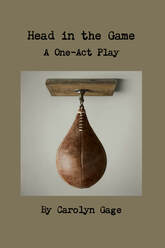
Online reading of Head in the Game and The Intimacy Coordinator, followed by discussion moderated by Dr. Stripe Gandara, with Dr. Melissa Farley, founder and director of Prostitution Research and Education.
Dr. Farley is a feminist psychologist who has written 40 peer-reviewed articles and two books on the sex trade. She founded the abolitionist nonprofit Prostitution Research & Education in 1995, dedicated to research and public education about prostitution, pornography, and trafficking.
The cast included Erik Hyack, Sarah Jayy, Seihara Major, Katherine Michelle Tanner, Amanda Sylvia Wagner, and Akia Woods.
2021: A Reading of In McClintock's Corn
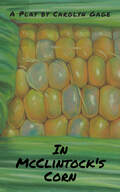
A live reading with Gage and Linda Starkweather of In McClintock's Corn at the lesbian-only B and B, The Highlands Inn in Bethlehem, NH
2020: Book Launch and Reading the Letters Between Rachel Carson and Dorothy Freeman
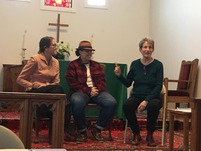 Brittany Parker, Tory Rosen and Carolyn Gage at the Book Launch
Brittany Parker, Tory Rosen and Carolyn Gage at the Book Launch
An afternoon of monologues and scenes from The Island Collection were read and performed in a book launch sponsored by the Southwest Harbor Public Library on Mount Desert Island.
In July, Carolyn Gage and Denise Poirier read excerpts of the letters between Rachel Carson and Dorothy Freeman in an event sponsored by the Southwest Harbor Public Library on Mount Desert Island. It was livestreamed, and the actors repeated the performance in November.
In July, Carolyn Gage and Denise Poirier read excerpts of the letters between Rachel Carson and Dorothy Freeman in an event sponsored by the Southwest Harbor Public Library on Mount Desert Island. It was livestreamed, and the actors repeated the performance in November.
2019: Lighting Martha
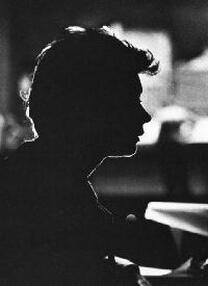
Lighting Martha was read in Portland, Maine and then performed at PortFringe Festival. It was directed by Julie Brooks Settlemire.
2018: Easter Sunday and The Secret Lives of Edna St. Vincent Millay and Rachel Carson
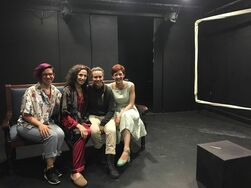
Easter Sunday was performed as a staged reading at the Highlands Inn in Bethlehem, Vermont, and also in Portland, Oregon. It toured in a full production to the International Dublin Gay Theatre Festival in Ireland, where the leading actor took home the award for "Best Actress in the Festival."
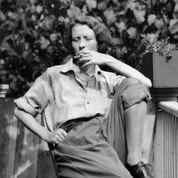
The Secret Lives of Edna St. Vincent Millay and Rachel Carson was performed as a staged reading at {elbow room}, at Waterfall Arts in Belfast, Maine.
2017: Calamity Jane Sends a Message To Her Daughter
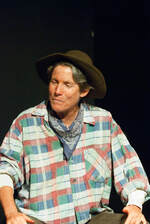
Calamity Jane Sends a Message to Her Daughter was performed at the Southwest Harbor Public Library as a special Support Women Artists Now (SWAN) Day initiative.
2016: The Parmachene Belle and Lace Curtain Irish
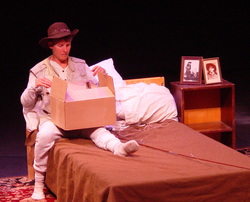
The Parmachene Belle toured to the Highlands Inn in March for a special theatre weekend of workshops and performance, and it was a featured performance at Bar Harbor's first-ever Pride Week, produced on a bill with a local production of Gage's play Souvenirs from Eden.
Lace Curtain Irish was featured at PortFringe in Maine and at the National Women's Music Festival in Madison, Wisconsin.
2015: Louisa May Incest, Gage on Stage, I Have Come to Show You Death, and Lace Curtain Irish!
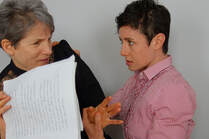
Louisa May Incest: Toured regionally to Vermont and Massachusetts with Carolyn Gage and Julia Reddy. Also featured at PortFringe. The writing of Little Women is interrupted when the character Jo March and her famous creator cannot agree on the ending. The struggle for control of the book becomes deadly when Jo accuses Louisa of repressed lesbian desires and incest memories.
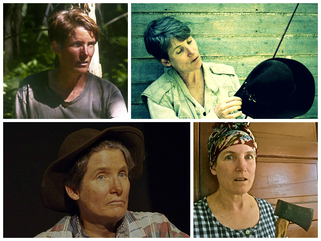
Gage on Stage: Toured regionally to Vermont and Massachusetts with Carolyn Gage and Julia Reddy. This was a showcase of monologues from Gage's dramatic works, coupled with a complete performance of the one-act Louisa May Incest.
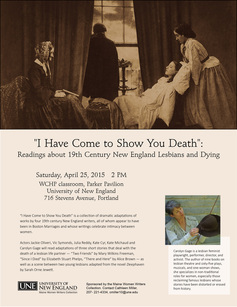
I Have Come to Show You Death: This staged reading was performed at the University of New England, featuring local actors. This show featured dramatic adaptations of the writings of four 19th century, New England women writers, dealing with lesbian life partners and death.
Lace Curtain Irish featuring Carolyn Gage for a special one-night performance at the Highlands Inn on Halloween night!
2014: To Rome With Love: A Musical Fundraiser
and
Staged Reading of Stigmata
and
Valerie Solanas At Matteawan
and
Gage on Stage (in Boston)
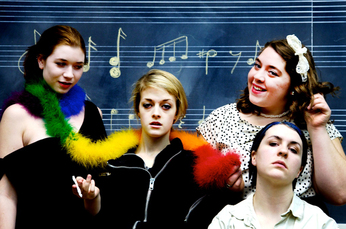 Alicia Phelps, Aria Tonini, Erin Morrison, and Aileen Andrews
Alicia Phelps, Aria Tonini, Erin Morrison, and Aileen Andrews
To Rome with Love: A Musical Fundraiser featured an entire evening of show tunes from musicals with book and lyrics written by Gage. The purpose was to raise travel funds for Gage to attend the 53rd World Theatre Day in Rome, where she was chosen as one of six international playwrights whose work would be featured.
The shows included The Amazon All-Stars, about a lesbian softball team; How To Write A Country-Western Song, about an all-women recording studio; Leading Ladies, about famous actresses; and Babe: An Olympian Musical about bisexual, butch athlete Babe Didrikson. Composers included Andrea Jill Higgins, Teresa Wilhelmi, Christa Hillhouse, Kitty Rose, and Sue Carney.
The shows included The Amazon All-Stars, about a lesbian softball team; How To Write A Country-Western Song, about an all-women recording studio; Leading Ladies, about famous actresses; and Babe: An Olympian Musical about bisexual, butch athlete Babe Didrikson. Composers included Andrea Jill Higgins, Teresa Wilhelmi, Christa Hillhouse, Kitty Rose, and Sue Carney.
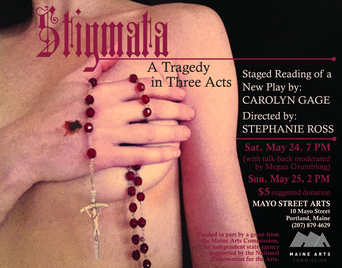
The staged reading of Stigmata directed by Stephanie Ross, at the Mayo Arts Center, with post-show discussion moderated by Megan Grumbling of the Portland Phoenix.
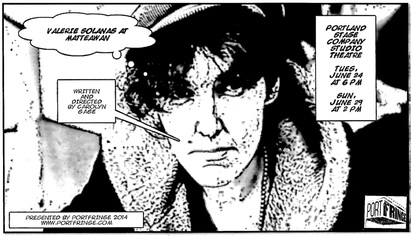
Valerie Solanas At Matteawan was produced at the Portland Fringe Festival in June... two performances!
Gage on Stage was produced in Boston at the Arlington Center for the Arts by Promoting Womyn's Voices. It featured Gage performing scenes and monologues from a dozen of her plays, with support from Boston actors Julia Reddy and Jean Kennedy.
2013: Little Sister and Harriet Tubman Visits A Therapist
and
Crossing the Rapelands
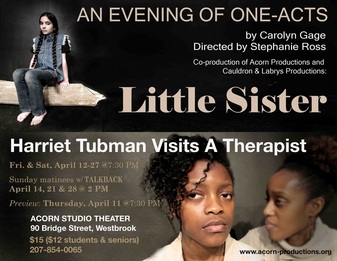
Warrior women were the subject of the two one-act plays by Carolyn Gage opening at the Acorn Studio Theatre. Acorn Productions, in collaboration with Cauldron & Labrys Women’s Productions, produced Little Sister and Harriet Tubman Visits a Therapist.
Harriet Tubman Visits a Therapist is a powerful play that has won multiple awards, including the national Samuel French Off-Off Broadway Short Play Festival and the national Lambda Literary Award in Drama. The play featured Alfine Nathalie and Gwira Kabirigi in a gripping confrontation between two women who share the same oppression, but whose definitions of survival are in direct conflict.
The second play, Little Sister, was a world premiere, featuring Beth Somerville, Beth Chasse, Carolyn Ezzy, and Angela Moline in an explosive drama about domestic violence on a Native American reservation, and how the legend of a Two-Spirit woman warrior offers a powerful model for breaking through the self-perpetuating chains of inter-generational trauma.
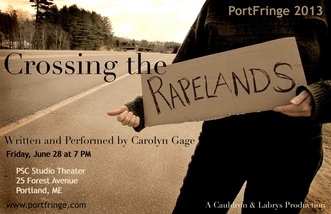
Crossing the Rapelands premiered at PortFringe 2013. This is a travelogue along the lines of the work of Spaulding Gray, about the playwright’s experiences of hitchhiking through America in the early 1970's—specifically about hitchhiking from Boulder to Los Angeles, to San Francisco and back with another woman in the summer of 1973. Gage incorporates the tales of other women crossing the "Rapelands" of the West: Sacajawea, Janis Joplin, Thelma and Louise, and the Women of the Oregon Trail.
2012: AXED!
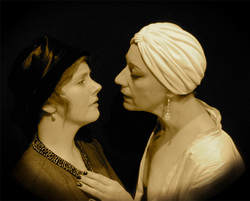
The Greatest Actress Who Ever Lived
An evening of one-acts about Lizzie Borden, AXED!, was produced. The evening included Denise Poirier in her touring production of Lace Curtain Irish and The Greatest Actress Who Ever Lived, with Karen Ball and Josieda Lord. The Greatest Actress was produced again at the Maine Association for Community Theatres, where it was invited to the 2013 New England AACT Festival.
Emily & Sue: A Love Story in 5 Scenes & 4 Seizures was performed at PortFringe and then toured to the Fresh Fruit Off-Off Broadway Festival in New York. Karen Ball performed the role of Emily Dickinson.
Emily & Sue: A Love Story in 5 Scenes & 4 Seizures was performed at PortFringe and then toured to the Fresh Fruit Off-Off Broadway Festival in New York. Karen Ball performed the role of Emily Dickinson.
2011: Harriet Tubman Visits A Therapist
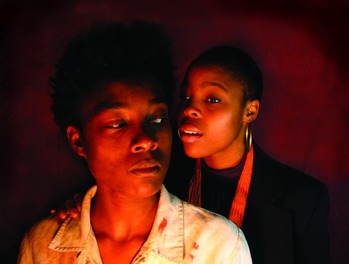
Harriet Tubman Visits A Therapist
In 2011, Cauldron & Labrys staged a reading of Speak Fully the One Awful Word at the Harriet Beecher Stowe at 200 Conference in Brunswick, Maine. This was an adaptation of Stowe's exposé of Lord Byron's incestuous relationship with his sister and abuse of his wife.
The C &S production of The Second Coming of Joan of Arc toured to the University of Victoria, Key City Public Theatre in Port Townsend, and to Arcata, California.
A staged reading of Harriet Tubman Visits A Therapist was presented in an evening that also featured "A Concert of Freedom Songs" by Mehuman Johnson and an art exhibit by Jonathan Frost, "The Death of Jimmie Lee Higgins." The event was introduced by Rachel Talbot Ross, the President of Maine's NAACP, and it was a fundraiser for Maine Freedom Trails. Tubman was played by Shatema Brook and the Therapist by Maureen Emerson.
A staged reading of Lace Curtain Irish was performed at the Maine Association of Community Theatres One-Act Festival in Auburn.
The C &S production of The Second Coming of Joan of Arc toured to the University of Victoria, Key City Public Theatre in Port Townsend, and to Arcata, California.
A staged reading of Harriet Tubman Visits A Therapist was presented in an evening that also featured "A Concert of Freedom Songs" by Mehuman Johnson and an art exhibit by Jonathan Frost, "The Death of Jimmie Lee Higgins." The event was introduced by Rachel Talbot Ross, the President of Maine's NAACP, and it was a fundraiser for Maine Freedom Trails. Tubman was played by Shatema Brook and the Therapist by Maureen Emerson.
A staged reading of Lace Curtain Irish was performed at the Maine Association of Community Theatres One-Act Festival in Auburn.
2010: The Year of Touring
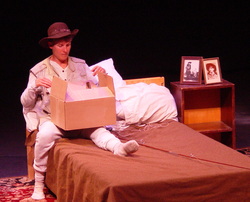
The Parmachene Belle
In 2010, Gage's production of Calamity Jane Sends a Message to Her Daughter toured to the University of Connecticut, Stamford. The C &S production of The Second Coming of Joan of Arc toured to the Women's International Theatre Festival in Provincetown. The Parmachene Belle was done for SWAN Day at the Maine Women Writers Collection and also for the Society of the Muse of the Southwest in Taos.
2009: Greetings from Lesbos, Maine
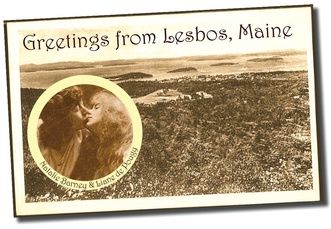
In 2009, Cauldron & Labrys produced an evening of readings and one-acts about famous lesbians in Maine’s history, Greetings from Lesbos, Maine. The plays included Souvenirs from Eden and The Parmachene Belle, as well as Deep Haven, an adaptation of Sarah Orne Jewett’s letters and writing, and a reading of Marguerite Yourcenar’s “Sappho.” They were co-sponsored by the St. Lawrence Arts Center, where they were produced.
In 2009, the C & L production of The Parmachene Belle toured to Unitarian churches in Biddeford, Maine, and in Brewster, Massachusetts. It was also performed at the Maine Association for Community Theatres Conference in Auburn, and toured to a Pride Festival in Rapid City, South Dakota.
In 2009, the C & L production of The Parmachene Belle toured to Unitarian churches in Biddeford, Maine, and in Brewster, Massachusetts. It was also performed at the Maine Association for Community Theatres Conference in Auburn, and toured to a Pride Festival in Rapid City, South Dakota.
2008: Women of the Rising
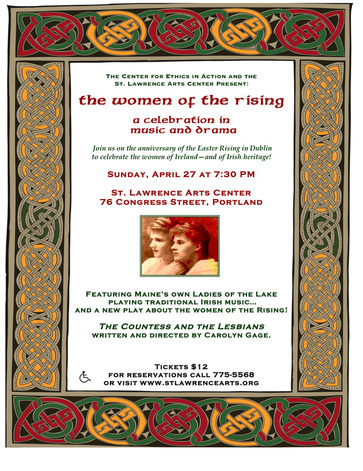
In 2008, Cauldron & Labrys produced an evening of theatre on the anniversary of the Easter Rising in Dublin. The evening was a celebration of the women of the Rising, and it included a concert by the Maine-based Irish women’s group, Ladies of the Lake, who selected songs about the Rising and about women, and Gage’s most recent play The Countess and the Lesbians, about Countess Markiewicz and her relationship to her lesbian sister and her sister’s partner at the time of the Rising. Women of the Rising was produced at the St. Lawrence Arts Center, and The Countess and the Lesbians also toured to the Maine Association of Community Theatres Conference held in Dover-Foxcroft.
The Countess and the Lesbians was produced that year at the Dublin International Gay Theatre Festival, where it garnered strong reviews, including one from the Irish Times. Gage was unable to attend the festival and used the Cauldron & Labrys production to workshop the play. It was such a hit at the Festival, that it sold out, and it was revived later in the fall at Liberty Hall.
Cauldron & Labrys also produced a one-woman evening of excerpts from Gage’s plays. This Evening with Carolyn Gage was produced at the North Star Café, and toured to Venus Theatre in Laurel, MD. This included readings and performances from The Second Coming of Joan of Arc,The Last Reading of Charlotte Cushman, Calamity Jane Sends a Message to Her Daughter,Babe, Heterosexuals Anonymous, and Cookin’ with Typhoid Mary. The C &L production of Calamity Jane was performed at TOSOS II in NYC, in conjunction with their reading of The Countess and the Lesbians.
The Cauldron & Labrys production of Calamity Jane was produced at an event of Maine playwrights co-sponsored by the International Center for Women Plawrights and the Maine Women Writers Collection, held at the University of New England’s Westbrook campus.
In 2008, The C&L production of The Parmachene Belle toured to a lesbian resort in N. Fort Myers, Florida.
The Countess and the Lesbians was produced that year at the Dublin International Gay Theatre Festival, where it garnered strong reviews, including one from the Irish Times. Gage was unable to attend the festival and used the Cauldron & Labrys production to workshop the play. It was such a hit at the Festival, that it sold out, and it was revived later in the fall at Liberty Hall.
Cauldron & Labrys also produced a one-woman evening of excerpts from Gage’s plays. This Evening with Carolyn Gage was produced at the North Star Café, and toured to Venus Theatre in Laurel, MD. This included readings and performances from The Second Coming of Joan of Arc,The Last Reading of Charlotte Cushman, Calamity Jane Sends a Message to Her Daughter,Babe, Heterosexuals Anonymous, and Cookin’ with Typhoid Mary. The C &L production of Calamity Jane was performed at TOSOS II in NYC, in conjunction with their reading of The Countess and the Lesbians.
The Cauldron & Labrys production of Calamity Jane was produced at an event of Maine playwrights co-sponsored by the International Center for Women Plawrights and the Maine Women Writers Collection, held at the University of New England’s Westbrook campus.
In 2008, The C&L production of The Parmachene Belle toured to a lesbian resort in N. Fort Myers, Florida.
2007: An Evening of Women's Anti-War Plays
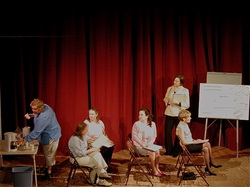
Rules of the Playground
In 2007, reflecting the national mood of growing unrest about the war in Iraq, Cauldron & Labrys produced two evenings of anti-war plays at the St. Lawrence Arts Center in Portland: The Second Coming of Joan of Arc and Rules of the Playground. The production was fiscally sponsored by the Center for Ethics in Action. Rules of the Playground also toured to the Maine Association of Community Theatres Conference in Thomaston. It was also performed at the Festival of the Book in Portland.
The Cauldron & Labrys production of Calamity Jane Sends a Message to Her Daughtertoured to an evening of plays at the Dramatists Guild in NYC, sponsored by the International Center for Women Playwrights.
The Cauldron & Labrys production of Calamity Jane Sends a Message to Her Daughtertoured to an evening of plays at the Dramatists Guild in NYC, sponsored by the International Center for Women Playwrights.
2006: Beyond the L-Word
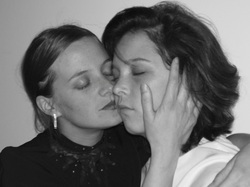
Entr'acte
In 2006, one evening of staged readings was performed at SPACE Gallery on Congress Street in Portland. Titled Beyond the L-Word, it included The Obligatory Scene, Entr’acte, and Bite My Thumb. They were sponsored by the Center for Ethics in Action.
In the summer of 2006, the Cauldron & Labrys production of The Parmachene Belle with Gage toured to the National Women’s Music Festival, at the University of Illinois campus in Normal. Gage’s performance of Calamity Jane Sends a Message to Her Daughter toured to the Maine Association of Community Theatre Conference held in Bath.
In the summer of 2006, the Cauldron & Labrys production of The Parmachene Belle with Gage toured to the National Women’s Music Festival, at the University of Illinois campus in Normal. Gage’s performance of Calamity Jane Sends a Message to Her Daughter toured to the Maine Association of Community Theatre Conference held in Bath.
2004: Wild Women Don't Get The Blues
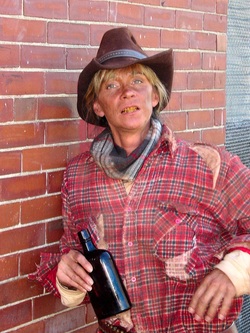
Leslie as Calamity Jane
In 2004, Cauldron & Labrys produced an evening of four one-acts, titled Wild Women Don’t Get the Blues. Leslie Bernardini, who had been performing two of Gage’s plays with the New England Academy of Theatre in New Haven, came up to Portland to perform Calamity Jane Sends a Message to Her Daughter and The Parmachene Belle. The bill included Cathy Plourde in Cookin’ with Typhoid Mary and a production of Artemsia and Hildegard. The plays were produced at the Company of Girls’ performance space on Mayo Street in Portland, and fiscally sponsored by Dragon Farm.
2003: Thanatron
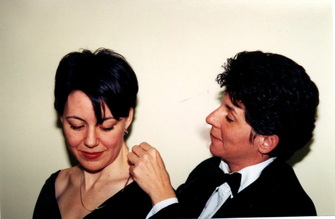
Thanatron
A year later, Cauldron & Labrys produced the world premiere of Thanatron, a dark comedy on the subject of assisted suicide, alcoholism, and incest. We leased the studio space of the Portland Stage Company, being the first company to do this under their new policy. This production was cursed with a series of problems, and Gage made the decision to cancel the final weekend performances. Here is a final report about the production to fiscal sponsor Dragon Farm:
The premiere production of Thanatron successfully met my primary goal, as its author, of allowing me to workshop the play, to see it on its feet, and to judge the audience response to the play. These are essential final stages for me in the playwriting process. We had nine performances, over a period of three weekends, and achieved outstanding coverage, not just for the play, but for women’s theatre. The Sunday Press-Herald, the Portland paper, put an article about me and about the company on the cover of their “Audience” section, including two photographs of the cast. The Phoenix ran both a photo and a long review of the show, which was positive. The Casco Bay Weekly also ran a photo, as did the Thursday “Go” section of the Portland daily paper. The photos run by the alternative papers portrayed a lesbian, butch-femme couple. This was a significant achievement in itself, in terms of the visibility of lesbian culture.
During rehearsals, we invited in an audience of women who were with the domestic violence movement here in Portland, and they were enthusiastic about the production. They brought us literature on domestic abuse, which we provided in a hall display along with AA and Al-Anon literature. We also had a display about the discrimination against women directors and women playwrights that was very prominent in our lobby. This included a report form the New York State Council on the Arts as well as a large poster from the Guerrilla Girls, a feminist activist group. The poster was titled, “Oh, The Joys of Being a Woman Playwright!” This was particularly salient, as we were in an Equity theatre with a season of plays by all-male playwrights, featuring predominantly male casts.
We also did extensive outreach to the local business community for program ads, and had more than thirty ads or donations of goods and services.
The play was seen by about three hundred people, and the response to it was enthusiastic. We were hurt badly by a blizzard our opening weekend, but our later shows were filling the house. We had a talk-back after the Sunday performance of the first weekend, with Dr. Patricia Cramer from the University of Connecticut, who has been a scholar of my work and who has taught Thanatron in English courses on the family and Women’s Studies courses on domestic violence. She has taught the play side-by-side with the writings of Kafka, Dostoevsky, and Virginia Woolf. This was a small but lively discussion.
The cast included fifteen women, of whom four had never acted before, and two had limited previous experience. The cast and crew included an African American woman and a Korean American woman. There were seven lesbians in the cast and three bisexual women. The company included two girls, ten and thirteen, as well as a high-school student.
The production was radical in that it featured women playing the men’s roles, and it was also unusual in that it was a comedy built around the subject of a woman’s desire to kill herself. The question as to whether or not an audience would allow themselves to laugh at subjects as grim as alcoholism, suicide, and incest was answered resoundingly night after night, and especially on the nights when the house was nearly full. As the reviewer stated, they “laughed their heads off.”
The strengths of the play were inseparable from the challenges of producing it. The entire project was compromised early on when the fiscal sponsor for my grants withdrew sponsorship from fear of being associated with a lesbian-themed play. Homophobia surfaced later at the auditions, when a number of actors walked out when they saw the lesbians who were auditioning. They said things like, “I’m at the wrong audition.” And, indeed, they were.
On the day that we loaded our lumber into the Portland Stage Company, the manager of the space registered consternation that a crew of women would be using power tools. He informed us that we would not be allowed to build our set. He had already seen and approved, and even advised us on our blueprints! This was a completely unprecedented level of sexism in my experience. I was called up to the business office, where it was explained to me that they did not have insurance to cover injuries that might be incurred from constructing a set. They told us we could have a set, but we were just not allowed to build it. I asked what they expected us to do, inflate it? All of us were very clear that this was a gender-based hysteria on their part. They would never have behaved so unprofessionally with a crew of men. They insisted that we take our lumber back out of the theatre. After several hours of negotiation, they backed off their position, but it was an uncomfortable situation for the company and created a breach in trust that was slow to heal. We were very clear by the way they spoke to us and looked at us, that they were not used to working with “out” and butch lesbians, women of color, or fat women in their theatre.
In April 2003, Jessica Chaples directed a staged reading of Battered on Broadway for the Maine Association of Community Theatres Conference held in Auburn.
The premiere production of Thanatron successfully met my primary goal, as its author, of allowing me to workshop the play, to see it on its feet, and to judge the audience response to the play. These are essential final stages for me in the playwriting process. We had nine performances, over a period of three weekends, and achieved outstanding coverage, not just for the play, but for women’s theatre. The Sunday Press-Herald, the Portland paper, put an article about me and about the company on the cover of their “Audience” section, including two photographs of the cast. The Phoenix ran both a photo and a long review of the show, which was positive. The Casco Bay Weekly also ran a photo, as did the Thursday “Go” section of the Portland daily paper. The photos run by the alternative papers portrayed a lesbian, butch-femme couple. This was a significant achievement in itself, in terms of the visibility of lesbian culture.
During rehearsals, we invited in an audience of women who were with the domestic violence movement here in Portland, and they were enthusiastic about the production. They brought us literature on domestic abuse, which we provided in a hall display along with AA and Al-Anon literature. We also had a display about the discrimination against women directors and women playwrights that was very prominent in our lobby. This included a report form the New York State Council on the Arts as well as a large poster from the Guerrilla Girls, a feminist activist group. The poster was titled, “Oh, The Joys of Being a Woman Playwright!” This was particularly salient, as we were in an Equity theatre with a season of plays by all-male playwrights, featuring predominantly male casts.
We also did extensive outreach to the local business community for program ads, and had more than thirty ads or donations of goods and services.
The play was seen by about three hundred people, and the response to it was enthusiastic. We were hurt badly by a blizzard our opening weekend, but our later shows were filling the house. We had a talk-back after the Sunday performance of the first weekend, with Dr. Patricia Cramer from the University of Connecticut, who has been a scholar of my work and who has taught Thanatron in English courses on the family and Women’s Studies courses on domestic violence. She has taught the play side-by-side with the writings of Kafka, Dostoevsky, and Virginia Woolf. This was a small but lively discussion.
The cast included fifteen women, of whom four had never acted before, and two had limited previous experience. The cast and crew included an African American woman and a Korean American woman. There were seven lesbians in the cast and three bisexual women. The company included two girls, ten and thirteen, as well as a high-school student.
The production was radical in that it featured women playing the men’s roles, and it was also unusual in that it was a comedy built around the subject of a woman’s desire to kill herself. The question as to whether or not an audience would allow themselves to laugh at subjects as grim as alcoholism, suicide, and incest was answered resoundingly night after night, and especially on the nights when the house was nearly full. As the reviewer stated, they “laughed their heads off.”
The strengths of the play were inseparable from the challenges of producing it. The entire project was compromised early on when the fiscal sponsor for my grants withdrew sponsorship from fear of being associated with a lesbian-themed play. Homophobia surfaced later at the auditions, when a number of actors walked out when they saw the lesbians who were auditioning. They said things like, “I’m at the wrong audition.” And, indeed, they were.
On the day that we loaded our lumber into the Portland Stage Company, the manager of the space registered consternation that a crew of women would be using power tools. He informed us that we would not be allowed to build our set. He had already seen and approved, and even advised us on our blueprints! This was a completely unprecedented level of sexism in my experience. I was called up to the business office, where it was explained to me that they did not have insurance to cover injuries that might be incurred from constructing a set. They told us we could have a set, but we were just not allowed to build it. I asked what they expected us to do, inflate it? All of us were very clear that this was a gender-based hysteria on their part. They would never have behaved so unprofessionally with a crew of men. They insisted that we take our lumber back out of the theatre. After several hours of negotiation, they backed off their position, but it was an uncomfortable situation for the company and created a breach in trust that was slow to heal. We were very clear by the way they spoke to us and looked at us, that they were not used to working with “out” and butch lesbians, women of color, or fat women in their theatre.
In April 2003, Jessica Chaples directed a staged reading of Battered on Broadway for the Maine Association of Community Theatres Conference held in Auburn.
2002: The Anastasia Trials in the Court of Women and Louisa May Incest
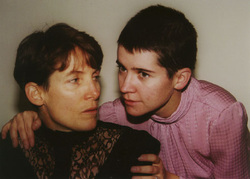
Louisa May Incest
Cauldron & Labrys Productions was founded in the fall of 2002, by playwright and performer Carolyn Gage. It was a women’s theatre company, and the purpose was to provide a laboratory and workshop for Gage’s plays.
The first production was The Anastasia Trials in the Court of Women, produced at the Actors Conservatory Theatre in Portland, in the winter of 2003. The play is described in Gage’s catalog as “A play with intense audience participation! Engrossing, controversial courtroom drama, where the audience must serve as judge and jury, deciding motions and verdict, in a case against the five women who betrayed the Grand Duchess Anastasia Romanov, the last surviving daughter of the Tsar of Russia. Complex ethical questions on a set of ten folding chairs. It was fiscally sponsored by the Feminist Spiritual Community.
We also workshopped a production of Gage’s one-act play Louisa May Incest, which was touring to the National Women’s Music Festival in Muncie, Indiana in the summer. We held one performance of the work for a local audience at the Actors’ Conservatory Theatre in Portland, and we also toured it to the annual Maine Association of Community Theatres Conference, helf that year at the Farnsworth Museum Theatre in Rockland. This was our first year at the MeACT Conference.
The first production was The Anastasia Trials in the Court of Women, produced at the Actors Conservatory Theatre in Portland, in the winter of 2003. The play is described in Gage’s catalog as “A play with intense audience participation! Engrossing, controversial courtroom drama, where the audience must serve as judge and jury, deciding motions and verdict, in a case against the five women who betrayed the Grand Duchess Anastasia Romanov, the last surviving daughter of the Tsar of Russia. Complex ethical questions on a set of ten folding chairs. It was fiscally sponsored by the Feminist Spiritual Community.
We also workshopped a production of Gage’s one-act play Louisa May Incest, which was touring to the National Women’s Music Festival in Muncie, Indiana in the summer. We held one performance of the work for a local audience at the Actors’ Conservatory Theatre in Portland, and we also toured it to the annual Maine Association of Community Theatres Conference, helf that year at the Farnsworth Museum Theatre in Rockland. This was our first year at the MeACT Conference.
